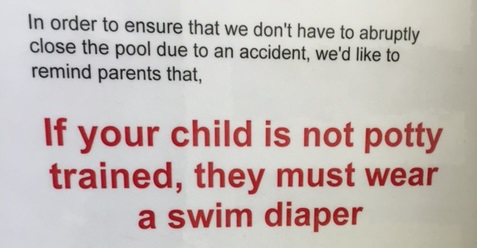Good Grammaring
Santa Barbara Be Doing It Pretty Good

“Grammar Nazi.”
That’s the harsh term applied to usually mild-mannered people who feel compelled to correct other people’s remarks online and sometimes, unwisely, aloud. I’ve largely avoided that slam by keeping my mouth shut and posts silent as much as possible. And I have to say, it’s easier to keep cool on the subject here in Santa Barbara because there aren’t many nits to pick.

This occurred to me the other day when I saw this sign outside a pool in Goleta: “If your child is not potty-trained, they must wear a swim diaper.” A grammar stickler might carp that, to make everything agree, it should be “If your child is not potty-trained, he or she must wear a swim diaper.” But that’s so yesteryear, as it turns out.
At last year’s powwow of American Copy Editors Society (ACES, of course), the use of “they” as a singular pronoun began to gain ground. (Ever wonder who decides these things? Blame these guys.) The thinking was that “you” has made the transition to both singular and plural, so maybe it’s possible, in these wacky, anything-goes times, to allow “they” to do the same, in order to avoid the clunky “he or she” mess.
Can you imagine the excitement in the conference hall? Mayhem! Pocket protectors flung skyward. Crusty old-guard veterans grumbling in the corner.
So it turns out the author of the swim diaper sign outside that pool in Goleta was right on. Cutting edge!
A couple days later I saw the same kind of thing on a sign in Ojai. It said, in part, “ … if your dog is too big to be held, please leave them outside.” Cutting edge times two!
According to my unofficial survey, Santa Barbara is living better grammatically than some places I used to call home. The only blatant issue I’ve seen is the sign outside the Santa Barbara Woman’s Club, which I’m told is a wonderful organization and not actually a club with only one member. Coincidentally, there’s also an Ojai Valley Woman’s Club. If these two clubs met at a convention, I’m sure there wouldn’t be just two attendees.
But overall, Santa Barbara is out-grammaring my old hometowns. One of these places was big on yard signs announcing whose property it was. This led to some major apostrophe problems. “The Hunter’s,” one placard proclaimed, suggesting that Elmer Fudd was inside, decked out in camo garb and brandishing a bird gun.
Right near my house was a lawn sign that said, “The Jone’s,” evidence that a fierce apostrophe struggle had been waged in the garage.
As an editor I was so beset by these issues that I proposed “apostrophobia” as a new entry for phobialist.com. Sadly, it hasn’t been accepted yet. (By the way, it’s a fascinating list. Basically, if it exists, somebody’s afraid of it. Example: “Aulophobia: Fear of flutes.” Watch out!)
People are annoyed by grammar and spelling know-it-alls, and they have a right to be annoyed, not only because the correctors are annoying, but also because English is weird and rules often depend on whom (!) you’re talking to. (Dangling prepositions allowed now, too.) When I was in grade school I was taught that “mens,” “womens” and “childrens” don’t need apostrophes because they have to be possessive, like “its.” I held onto this belief until a copy editor thrashed it out of me years later, but secretly I still think it makes sense.
Coincidentally, I recently saw a sign inside an Ojai shop that said “Womens Blouses,” and I wondered briefly if my old teacher might have been the author. But a few steps farther revealed a sign on the other end of the rack that said “Womens’ Blouses.” This is a good strategy in theory: Try a number of options, and one might be right. (Though not in this case.)
Which brings us somehow to the latest grammar dustup, over the Oxford comma. This is the comma before the “and” at the end of a series. Like “I went to Stearns Wharf with Oprah, Jeff Bridges, and Katy Perry.” I was taught that the last comma is redundant because the “and” does the job. Not so, according to lots of smart people, and the fight is currently being waged all over again. Fresh salvos were just fired in The Atlantic, thanks to associate editor Emma Green, who invited readers to “enter the fray,” adding, “But beware: I have gotten into fights over the Oxford comma at weddings, in the Atlantic offices, and at bars. Bring it on. I have no fear, no doubt, and no shame about tedious pedantry.”
Here’s the case for the pro-Oxford side: Without it, you could find yourself in a ball of confusion. Like this one (found in a Grammarly blog):
“Jim loves his parents, Lady Gaga and Humpty Dumpty.” Without the Oxford comma, someone might mistake his parents for Gaga and Dumpty. Which means Jim might want to get a genome test.



